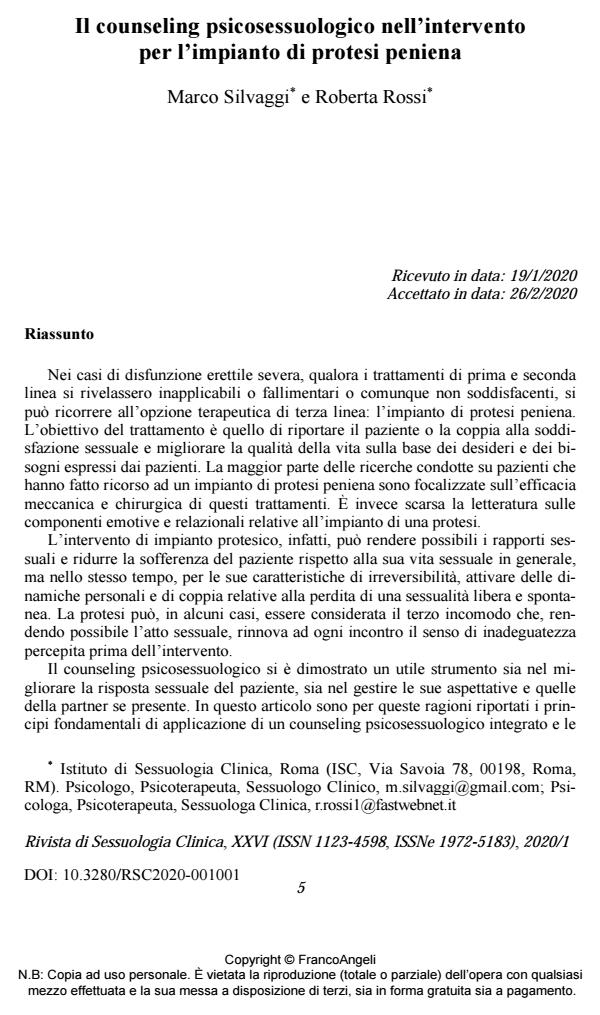Psychosexual counseling in the penile Prosthesis implant process
Journal title RIVISTA DI SESSUOLOGIA CLINICA
Author/s Marco Silvaggi, Roberta Rossi
Publishing Year 2020 Issue 2020/1
Language Italian Pages 21 P. 3-25 File size 318 KB
DOI 10.3280/RSC2020-001001
DOI is like a bar code for intellectual property: to have more infomation
click here
Below, you can see the article first page
If you want to buy this article in PDF format, you can do it, following the instructions to buy download credits

FrancoAngeli is member of Publishers International Linking Association, Inc (PILA), a not-for-profit association which run the CrossRef service enabling links to and from online scholarly content.
In cases of severe erectile dysfunction, if the first- and second-line treatments show to be inapplicable or unsuccessful or otherwise unsatisfactory, the penile prosthesis implant, as thirdline therapeutic option can be used. There are two types of penile prosthesis implant, semi-rigid and inflatable or hydraulic, which in turn can be bior tricomponent. Penile prosthesis implantation is a complex and irreversible intervention and therefore a careful screening of patients is necessary, considering medical and psychological conditions (mood disorders, phobic traits and obsessive-compulsive disorders, psychotic symptoms). In fact, the causes of sexual dysfunctions can be both medical-pharmacological and psychogenic, but even when the symptoms are mainly organic, these dysfunctions will generate or exacerbate problems in the psycho-emotional and/or relational area of the patient, maintaining and/or chronicizing the disorder or compromising the individual’s well-being. The objective of the treatment is to restore the patient or couple to sexual satis-faction and improve the quality of life based on the wishes and needs expressed by the patients. Counselling based on these needs is an essential component of pa-tient management and requires the creation of good communication to foster posi-tive interactions between patient and doctor, ensuring that the patient’s concerns are addressed. Most of the research conducted on patients who have used a penile implant is focused on the mechanical and surgical effectiveness of these treatments. There is little literature on the emotional and relational components of im-plantation. This lack takes on greater importance if we consider that the successful outcome of a corrective surgery for erectile dysfunction also depends on a number of relational factors, such as the role that sexuality plays within a couple. The prosthetic implant intervention, in fact, can make sexual intercourse possible and reduce the patient’s suffering with respect to his sexual life in general, but at the same time, due to its irreversible characteristics, it can activate personal and cou-ple dynamics related to the loss of a free and spontaneous sexuality. Psychosexual counselling has proved to be a useful tool both in improving the patient’s sexual response and in managing patient’s expectations and those of the partner if present. In most of cases, to date, preoperative counselling is represented exclusively by information about the surgery, any complications or variations with respect to preoperative sexuality or sexual dysfunction and is carried out directly by the surgeon in a short session. While, in agreement with Pisano and his collaborators, a counseling performed by a psychosexologist distributed over a pre and post-operative period of time seems crucial to obtain better results for the patient and the couple. In fact, a psychosexual counseling is configured as an intervention not only informative, but also aimed at helping the patient, to manage his particu-lar condition and to develop his erotic sphere. For these reasons, it seems highly desirable that the psychosexual counselling of the individual and the couple con-stantly supports the medical evaluation and becomes an integral and essential part of the screening process of candidates for the surgical implant. In order to reduce difficult situations dictated by the patient’s or partner’s fears about the transformation of the couple’s sexuality and intimacy or based on unrealistic expecta-tions. The counseling intervention could be structured on a standard of four meet-ings, lasting one hour, to be carried out with the individual or the couple if present, at key moments in the process of implantation and recovery of sexual function. The timing can obviously be modified according to the specific case in agreement with the professional figures involved in the process. The interaction between psy-chosexologyst, urologist and surgeon must be considered the fundamental principle of good counselling. Each professional figure is characterized by specific skills and competences and by clear limits in terms of intervention potential. The inte-grated approach and the collaboration and communication between professionals is crucial for a good outcome. For these reasons, this article reports the basic prin-ciples of application of integrated psychosexual counseling and the operational phases of implementation as summarized in the algorithm related to the integrated path of penile prosthesis implant surgery.
Keywords: Counseling, Penile prosthesis implantation, Erectile dysfunction, surgical treatment
Marco Silvaggi, Roberta Rossi, Il counseling psicosessuologico nell’intervento per l’impianto di protesi peniena in "RIVISTA DI SESSUOLOGIA CLINICA" 1/2020, pp 3-25, DOI: 10.3280/RSC2020-001001